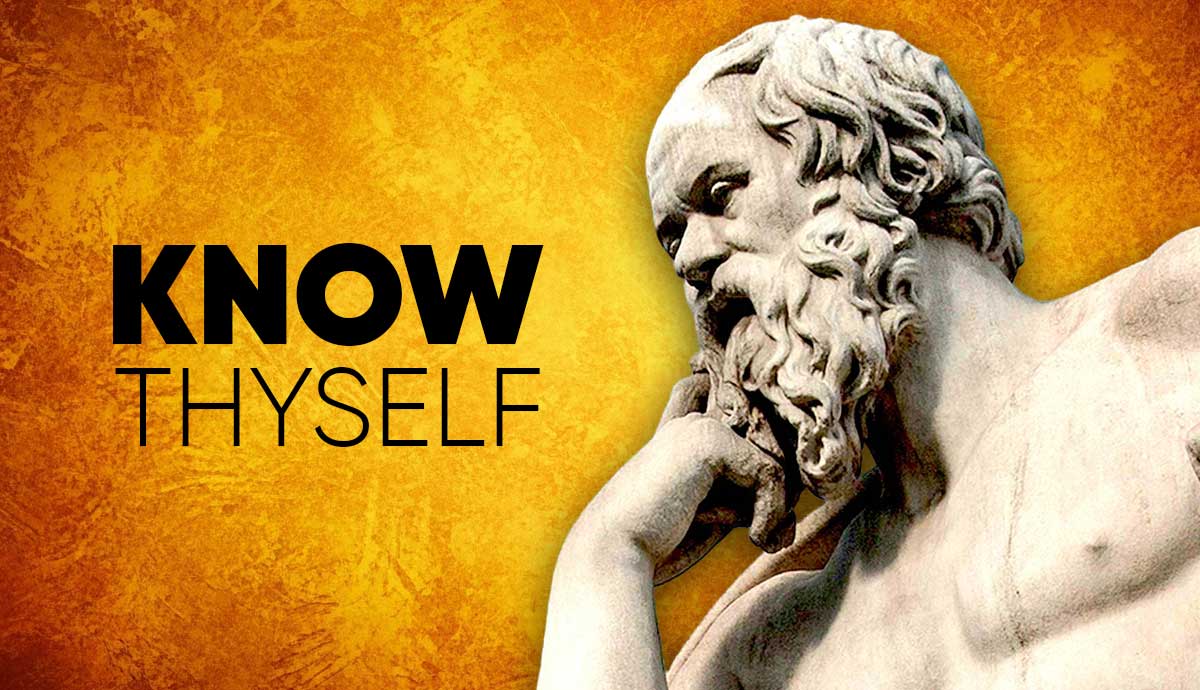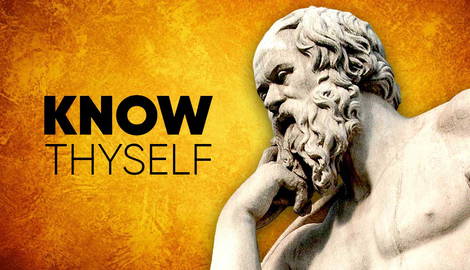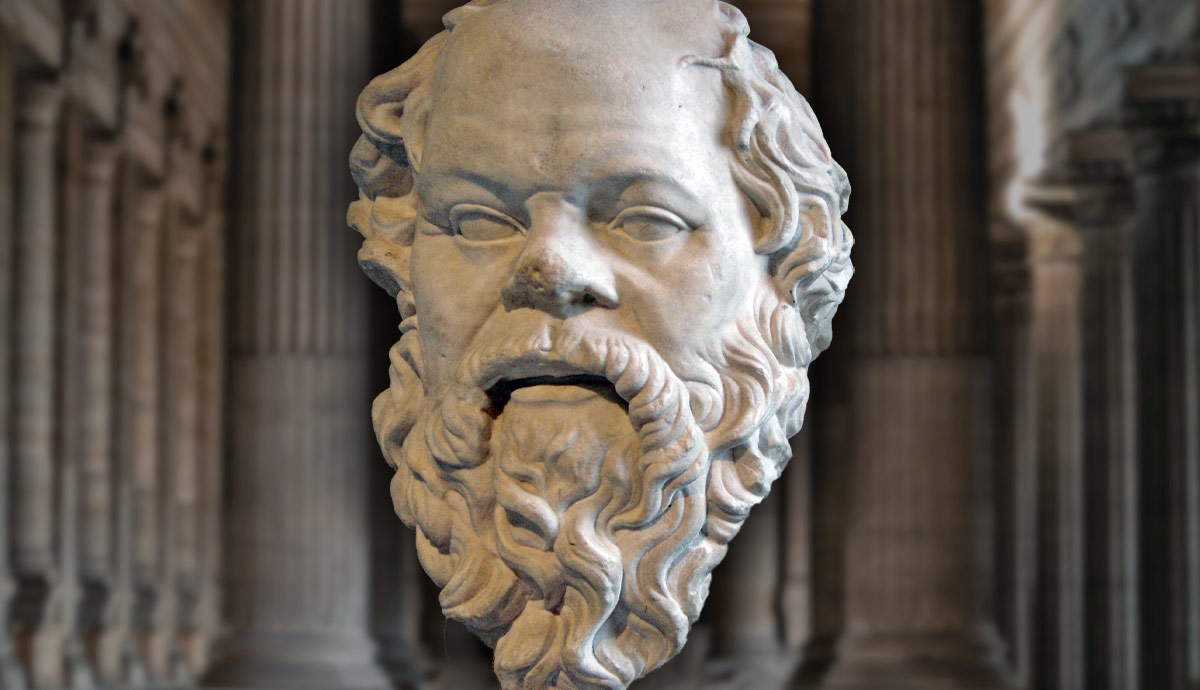
Inscribed at the Delphic temple of Apollo was the famous maxim, ‘know thyself’, a charge that Socrates continuously invoked in numerous Platonic dialogues. Self-knowledge was the essence of Socrates’ philosophical project, not in the modern sense of self-discovery, but in the context of self-examination and moral maturity. In this article, we uncover what self-knowledge is and why it was so important for Socrates.
Which Platonic Dialogues Contemplate Self-Knowledge?

Numerous Platonic dialogues contemplate self-knowledge, including Charmides and Phaedrus. In Charmides, Critias argues that the Delphic maxim, “know thyself”, is a greeting that means ‘sôphrosynê’, which is typically translated as temperance, and literally means ‘soundness of the mind’. Socrates challenges Critias’ definition of self-knowledge as a reflexive knowledge, involving knowledge of one’s inner state. The dialogue presents a tension between the definition of self-knowledge as a reflexive type of knowledge or as a knowledge with objective intentionality, meaning a knowledge directed at an object. Further, it explors the possibility and usefulness of that knowledge. Although the dialogue ends inconclusively, it shows that self-knowledge is a self-examination that involves constituting ourselves as knowers, becoming aware of the limitations of our knowledge, and applying our knowledge of what is good into our actions.

In Phaedrus, Socrates famously proclaims, “I am not yet able, as the Delphic inscription has it, to know myself”. In this passage, Socrates explains why he has no time to contemplate the truth behind ancient Greek mythology. The passage highlights the importance of self-knowledge and suggests that self-knowledge is an ongoing process. One would assume that a philosopher as mature as Socrates would have completed the task of self-knowledge, but the Phaedrus shows that self-knowledge is not a destination but an ongoing journey, as there is always more room for self-examination and moral self-improvement. Further, in discussing the necessity of a ‘mirror’ to witness one’s beauty, The Phaedrus highlights the necessity of another person’s presence, acting as a ‘mirror’ reflecting oneself, in the process of self-knowledge. This shows that self-knowledge is not only an introspective, but also a dialectic, pursuit.
What Is Self-Knowledge According to Socrates?

According to Socrates, self-knowledge is a moral and dialectical process of self-examination. It involves examining one’s beliefs, knowledge, and actions. Most importantly, it involves recognizing the limitations of one’s knowledge, as evident in Socrates wise declaration in Appology, “All I know is that I know nothing”. Further, self-knowledge is a process of self-constitution, a creative becoming. As prominent scholar Christian Moore argued, Socratic self-knowledge does not take as its object of knowledge a pre-existing ‘self’. Rather, it requires becoming a ‘self’ that can be an object of knowledge.
This can only be done through continuous self-examination and moral effort, without which one’s self cannot be a clear and unified object of knowledge. For Socrates, self-knowledge is a dialectic pursuit, for one’s beliefs, desires, or ideas are most apparent when discussed with others. Conversation is indispensable to self-examination, which is perhaps why the Platonic Socrates finds his wisdom in dialogues rather than mere introspection.
What Is the Relationship Between Self-Knowledge and Morality?

For Socrates, self-knowledge is indispensable to morality, because it involves constituting oneself as a person who can be guided by knowledge toward a moral life. Self-examination is, in itself, a moral effort. By examining our beliefs, desires, ideas, and actions in conversation, we can improve ourselves, learn about others, and live a virtuous life. The Delphic maxim, “know thyself”, is not an intellectual exercise, but a moral imperative. As Moore remarked, Socratic self-knowledge is “coordinated with maturation, the appreciation of and attempt to deal with one’s fields of ignorance, and striving for rational and moral responsibility” (Moore, 2015). The moral significance of Socratic self-knowledge is why it continues to influence contemporary discourse on ethics and self-improvement.
Why Is Self-Knowledge Important According to Socrates?

According to Socrates, self-knowledge is of the utmost importance because it underlies his life’s project. In Apology, Socrates famously said, “The unexamined life is not worth living”, emphasizing the existential relevance of self-knowledge as the purpose of life. For if one does not know oneself, one cannot live a morally good life. Significantly, Aristotle claims that Socrates’ whole intellectual journey is “founded on and textured by his response to the [maxim know thyself]” (Moore, 2015). In all the Platonic dialogues, Socrates is involved in self-knowledge as a form of dialectic self-examination, unearthing and exploring the beliefs, ideas, and desires of his interlocutors. His life is an example of what it means to live in obedience to the Delphic imperative, revealing that self-knowledge is indispensable to living a moral and virtuous life.







